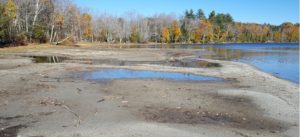History Observations By Lew Lester
Lew has lived on McGrath Pond Road since 1970, and at the northwest corner of the lake since 1982. Their current home, once a town schoolhouse when Oakland was known as “West Waterville,” later served as the central dining hall for Maple Nook Bungalows.
Recreation Areas: In 1999, the Town of Oakland acquired a large commercial campground in the northeast part of the Pond and turned it into Pleasant Point Park, a wonderful enclave for family gatherings, field sports, picnicking, swimming, walk–in boat launching, and fishing during the warmer months – and a staging area for ice fisherman from December to April.
Ice Fishing: Although they were always a few day–trippers, most of the ice fisherman before 1999 set their shacks out just after New Years and left them there until April. Now, these shacks are limited, replaced in large part by day–trippers on snowmobiles and a few walk–ins, sometimes taking shelter in light, tent–like structures. But ice–fish they do — on many weekends, the number of fisher–folk far exceeds anything in summer.
Boating: In the early decades of my residence here, the boat traffic was quite astounding, and almost entirely of fishermen. More recently, I have sometimes been alone on the lake. The hordes of fisherman have given way to solitary kayakers, occasional couples in canoes, macho folks on jet skis, and a few big–engine vessels pulling water skiers and kids on tubes. The late afternoon now is notable for a ritual procession of pontoon boats, slowly circling the shoreline as aging passengers check out their neighbors and sip beverages in the waning sun. Our personal watercraft fleet has tracked the dynamics of age, stage, and changing times: The aluminum fishing boat gave way to a small racing sloop, followed by canoes, kayaks, and paddle boards as children and grand–kids matured, and a pontoon boat in our golden years.
Open–Water Fishing: It ain’t what it used to be! Anglers came from all over New England, reeling in honking–big catches of prized species. Few if any trailered their own vessels because the cottages and sporting camps offered rental boats for their clientele. Pulling in the big ones was a lot easier in the 1970s and 1980s than it is today.
Water Quality: As one of the headwaters and shallower lakes in the Belgrade chain, McGrath Pond has enjoyed the benefits of both a nearly constant stream–fed inflow and the absence of the oxygen–depleting stratification that plagues deeper lakes, such as our sister to the south, Salmon. But we have recently witnessed more abundant weed and algae growth, occasional fish kills, and a couple of concerning episodes of very low water. The Pond’s northwest cove, where I live, has been badly compromised by the incursion of road sand and other

deposits via a feeder brook, and the expanding sediment delta has required us to relocate our mooring several times. Because of the sediment, our dock was unusable during periods of low water. The sediment also brings nutrients into the lake, which is very bad because it adds to weed and algae growth. The impact of both human and natural changes over the two–thirds of my life spent on this little Maine lake is readily apparent – sometimes uplifting, and sometimes frightening.
What will our beloved lake be like a half–century from now?